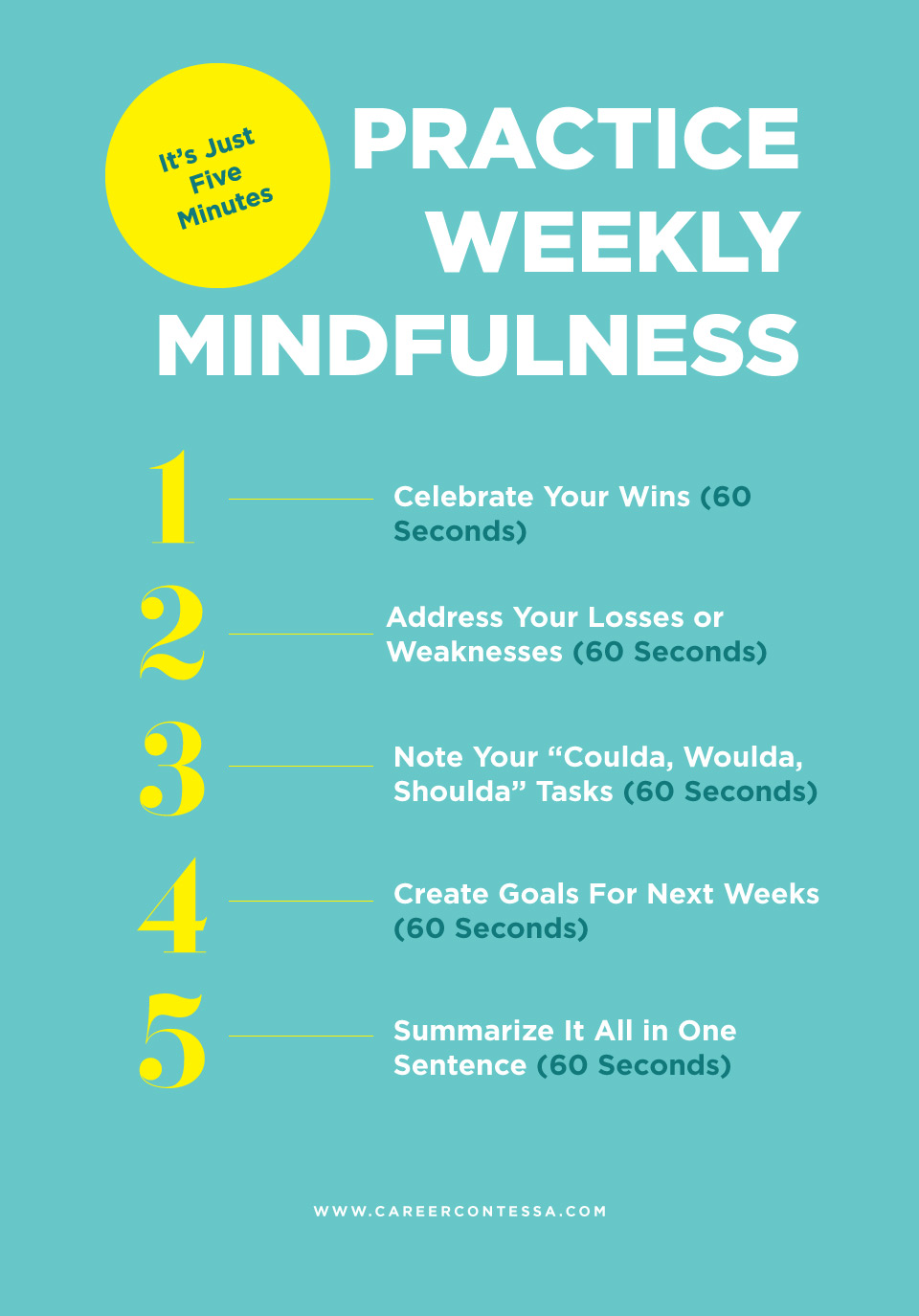When is the last time you conducted a self-evaluation *for fun*?
If your experience is like most people’s, you really only look at your past work when you have to write a cover letter or update your resume. What do I say about myself and why does it matter? How do I even begin to put this together?
Let’s rewind a bit. You likely spend around 40 hours a week at your “traditional” job. Since you’re an optimal employee (winky face) we know you do great work—on a daily basis. So, why, when it comes to putting together a
tight resume or a creative and
illustrative cover letter do we draw blanks?
Often, it’s because we let work go by. We come in Monday, keep our heads down, and we take care of business. Before we know it, another year has passed—and we ask ourselves, “Where did the last year go? What even happened?”
Because we weren't keeping track, we have no perspective of our own work, our strengths, our shortcomings, and everything in between.
In short, we need to slow down for a minute. Here’s our challenge to you: before hightailing it to your next weekend full of hikes, Netflix, and yoga—take a minute to reflect on the week you completed. We've come up with an easy way to conduct a weekly self-evaluation for work on a consistent basis.
By gifting yourself (and your career) regular self-appraisals, you'll be able to take pride in your work, track your work processes, and make your own recommendations for the next year. Yes, you can be your own mentor.
Let's dive into it.
Jump to Section:
The Benefits of Self-Evaluations
Besides the fact that a self-evaluation makes it easier to fill out your yearly
performance evaluation and be aware of all the great achievements you're making on the regular at work, we've got a few more to keep in mind!
- Monitor the progress of your goals: We love to set yearly goals, but the reality is we live our lives in how we spend our days and weeks. Set your smart goals and then allow your self-evaluations to help you keep track of the small steps of progress along the way.
- Remind your boss of your achievements: You know how hard you're working, but does your boss? We love this email hack that gives your boss regular updates on your achievements and doesn't add another "to-do" item to their plate. When you conduct self-evaluations, you can quickly send updates to your boss.
- Adapt, grow, and change plans when work priorities change: Self-evaluations allow you to identify areas for growth with specific examples. Additionally, since self-evaluations are a time to reflect on opportunities for improvement, you can learn what areas of your career you want to advocate for, the professional development resources you need, and what skill gaps you need to fill.
- Save time and have fewer "surprises" in your performance review: The goal here is that you should always expect what’s coming during your upcoming performance appraisal. You can almost guarantee this by reviewing your notes throughout the past year and reflect on what worked, what didn't go as planned, constructive feedback you received, your time management, interpersonal relationship skills to discuss with your manager, etc. From here, you can make new performance goals based on your own progress.
Your 5-Step Weekly Evaluation Practice
We know,
mindfulness is a buzzy word, but it
is meaningful. As people—and especially as women—we rarely slow down enough to take in our accomplishments.
While we never forget our blunders, we need a reminder to celebrate our wins.
It’s our hope that, by taking five minutes on a Friday, you can create and maintain a dedicated time to really look at the week behind you. Take this time to count your wins, your losses, and where you’d like to improve.
So, take out your timer and set it to sixty seconds. Here’s an easy five-step way to summarize your week using this self-evaluation template:
Step One: Celebrate Your Wins (60 Seconds)
This is the most important step, especially when—down the line—you will need to
revamp your resume or LinkedIn profile. Get those wins on paper—or else you will forget about them. This isn’t
Fight Club, so the rules are reversed. The first rule about a great win is
talking about a great win.
Noticing your wins is the first step to actually realizing them. Rather than saying “Well, it is my job” or “It’s not that big of a deal,” take the moment to revel in it. You
set a goal and you achieved it.
In addition to documenting your win, insert details about it. If you have specific numbers or metrics you hit, document that. If you built a specific team to overcome an obstacle, include those details and the names of the players involved. Did you reach your sales targets well before the end of a quarter? If you deployed a brand new strategy, write down the dirty details of how you did it. Get specific by pulling analytics, naming the platforms used in your work, or including the specific customer satisfaction quote about your work.
Once you have gathered a few weeks of wins, you will look back. Even if you’re not
job searching, this practice is extremely helpful in recognizing patterns that lead to success.
Step Two: Address Your Losses or Weaknesses (60 Seconds)
Just like celebrating wins, recognizing losses or missed targets in your own work is equally important. As painful as they may be, we learn so much from our losses—sometimes we gain more insight from a single failure or
weakness than we do from a dozen successes.
Creating this checklist is like ripping off a bandage, so let’s do it quickly. Create two columns:
- The loss
- How I will remedy it going forward
Did you make
a spelling error in an important email to a client? Next time, take those extra two minutes to spellcheck that email. Did you forget to follow up with a colleague about a project? Set daily reminders for check-ins on certain projects. Did you oversleep and come in late on a Tuesday? Make sure you’re
getting enough sleep—and maybe skip that third glass of wine over dinner.
If you made it through the week with perfect grammar, no schedule conflicts, exemplary communication, and eight+ hours of sleep a night, you can still spend some time on this section. Instead of communicating a hard loss, spend these 60 seconds on what you’d like to work on—professionally and personally. Maybe it’s your
innate fear of public speaking. Maybe it’s working up the confidence to
ask for a raise (in which case, maybe you want to spend 120 seconds on step one), or maybe it’s a skill set you want to pick up over the next weeks.
If you don’t see any hard losses, that’s awesome—use this section as a wish list for
overcoming any weaknesses you might see.
Step Three: Note Your “Coulda, Woulda, Shoulda” Tasks (60 Seconds)
Here’s a little in-between area to explore.
These are the bullet points from
your to-do list that got bumped to the bottom of the list, didn’t get completely fulfilled, or were ignored entirely.
These are usually jobs that are a pain to complete, that take you away from your more important job responsibilities, or that you just hate completing. That doesn’t mean they aren’t important to tackle. After all, there’s a reason they showed up on your to-do list in the first place.
There are lots of questions to be asked of these “coulda, woulda, shouldas.” Are these tasks you neglected to the detriment of your week? Or are they tasks better suited for someone else in your department? Did you knowingly neglect to complete this work? Do you regularly put this work off?
For this list, create three columns:
- The first column will annotate the task itself
- The second column will list the problem or reason the task was not completed
- The third will list a solution for making sure it gets addressed in the coming week
With some of our more annoying tasks at work, sometimes it is best to tackle them first. Everybody has those pesky things they don’t want to do. Once you recognize your “coulda woulda, shoulda” tasks, consider giving them the priority space at the top of your list in the weeks to come.
Step Four: Create Goals for Next Week (60 Seconds)
Let’s set the stage. It’s around 3:30 pm on a Friday. You’re itching to get out of work, but you have a few loose ends to tie up and a couple of emails you’re waiting on to close out your week. This really is
the perfect time to set some goals.
Here’s the thing about goals. If you don’t set them, you might be lucky to happen upon some success. However, simply by recognizing and setting a goal, you are so much closer to actually achieving it—with purpose. How amazing is that?
Another cool perk about setting goals? You can check back with yourself next week. Did you achieve those goals or did you make progress towards them? What could you continue to do to chase those goals down?
Step Five: Summarize It All in One Sentence (60 Seconds)
Wrap up all your learnings into one or two sentences that can summarize your week. Think of this section as "tweet-length"—and summarize your week in 280 characters or less. Once you've honed in on what's really important, your "weekly tweet" will convey the most crucial takeaways—whether they are positive outcomes or learnings from negative "failures."
Tips to Follow for Writing an Effective Self-Evaluation
Now that we've given you a 5-step self-evaluation template, let's review some best practices that you'll want to follow as you complete this each week. By following these tips, you'll ensure the information you track each week is useful.
1. Get Specific With Examples
When you're too vague about your achievements or progress, you lose the attention of the other person. You don't want to lose your boss's attention when you have a big ask prepared.
Instead, be specific and provide examples. They provide context and highlight your skills, achievements, etc. in ways that add real value to your boss. For example, perhaps you won over a client—and not just because the product you sell is great, but also due to your consistent follow-up strategy.
Success is usually a combination of several factors, and if you're struggling to get more specific or think about examples, brainstorm the following list:
- Behaviors you get the most feedback on
- Skills or strengths you bring to your work
- The tasks that energize you the most
- Your areas of expertise
Lastly, you can always use a tool we use in interview prep called
story circles to help you think about examples. Once you come up with a few stories, select the ones you want to highlight in your review and elaborate on them with specific examples that illustrate each quality.
2. Use Data to Back Up Your Contributions
Make your contributions really stick by including data points. This works better than just words because numbers create a clear connection between performance and results. Also, most humans find quantitative data easier to understand and digest.
The other benefit of providing specific numbers to back up your results is that they provide you leverage—leverage you can use to get a bonus,
ask for a salary raise, or request a
hybrid work schedule.
3. Follow a Growth Mindset
Fixed mindsets make you rigid, and in today's career landscape, you have to adapt and be flexible. Success depends on this. When you're doing a self-review each week, check in with yourself. Is your mindset oriented toward
growth? What can you do to make sure your mindset doesn't get in the way of your success? Mindset plays an important role in all that we do.
Examples to Use for Your Own Self-Assessment
There are a wide variety of self-evaluation prompts, but we found in our own research that
manager's like to focus on a few key themes in performance reviews. We'll use those same themes below to provide a few examples for your weekly self-evaluation.
It's important to only use these examples as inspiration for your own self-evaluation wording. In other words, be sure to personalize your examples with relevant details, metrics, and achievements. Tailor them to what you know matters most to your own manager.
Example About Achievement:
Wins:
-
Went beyond by creating an online onboarding program that both remote, hybrid, and in-person employees can use. Resulted in a streamlined approach, saving time and company resources with training, and earning a new hire satisfaction rating of 95%.
-
Increased revenue by 10% by updating older blog posts with SEO best practices. By increasing traffic to our top blog posts and including a customer intake form on those pages, our sales team has been able to turn these qualified leads into sales faster.
Areas for Improvement:
-
I can be more efficient with my strategy if I can delegate more administrative and repeatable tasks to a junior employee. To help with any delegation, I will need to create training documents and video tutorials, so I need to manage my time to create this upfront.
Example About Collaboration:
Wins:
-
I thrive on ensuring all teams understand expectations before we start a new client project. I do this by utilizing online project management tools, setting up weekly check-in meetings, and then sending progress reports to the client.
-
I'm the most energized by work that is done in a collaborative setting. Recently, I worked with HR, recruiting, and a hiring manager to improve our job interview feedback loop. This is producing a better outcome for all of us that are involved in the hiring and onboarding of new team members.
Areas for Improvement:
-
Sometimes I can become distracted by who is the ultimate decision-maker. While I like to work in a group setting, there needs to be a decision-maker. That role needs to be communicated upfront. This will make sure that a project progresses forward but also make sure people don't get frustrated if/when their contributions are part of the solution.
Examples About Communication:
Wins:
-
Effectively ran team meeting with an agenda sent out 2 days prior and left the meeting with assigned tasks for each person who attended. Received positive feedback about the efficiency of the meeting from Jenna and Jim from the marketing department.
-
Turned constructive feedback from Charlie in accounting into an improved process. First, I created my own QuickBooks account. Next, I reviewed a training about invoices. Lastly, I used that information and worked with Charlie to update our financial report template to ensure we are invoicing clients the same way the accounting team is reconciling accounts. This should save time and help mitigate any miscommunications between the property manager and the accountants working on that property.
Areas for Improvement:
In Summary
Maybe some of this sounds pretty obvious. Sure, we agree. But, just like anything, it’s helpful to implement healthy habits around recognition and cognizance at work. By implementing a weekly self-evaluation, you are keeping an important paper trail of your own habits, strengths, weaknesses, and—let’s face it—your own workplace superpowers.
Take the five minutes and try it out. Your entire career will thank you.












